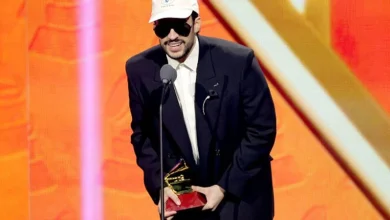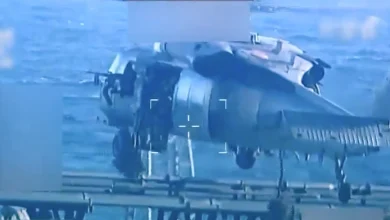In Heated Rivalry, hockey players find love in the locker room

Listen to this article
Estimated 4 minutes
The audio version of this article is generated by text-to-speech, a technology based on artificial intelligence.
The new TV show Heated Rivalry is brimming with passion — in every sense of the word.
The highly anticipated six-part series on Crave is an adaptation of books by Nova Scotia-based author Rachel Reid, from her bestselling Game Changers series.
The story follows two hockey players, Shane Hollander and Ilya Rozanov, who are at the top of their game. The rival team captains have undeniable chemistry, however, and their relationship quickly becomes something more than just professional.
Today on Commotion, Etalk senior correspondent Lainey Lui and former professional hockey player Brock McGillis join host Elamin Abdelmahmoud to talk about the steamy new show, and why hockey romances are getting so much attention right now.
We’ve included some highlights below, edited for length and clarity. For the full discussion, listen and follow Commotion with Elamin Abdelmahmoud on your favourite podcast player.
LISTEN | Today’s episode on CBC Listen:
Commotion with Elamin Abdelmahmoud32:45The gay hockey romance Heated Rivalry is lusty, horny, and real, and why Claire Danes’ face has the internet talking
Elamin: What do you think it is about hockey that makes it a setting for romance that people want to turn to, Lainey?
Lainey: Canada, don’t come for me, but hockey is a not-very-diverse sport. And in terms of all the professional sports, it’s not as popular, right? Like, that’s a fact. It’s very popular in Canada, but globally, especially in North America, it’s not up there with your Major League Baseball’s and the NFL. And so I think even the way hockey is covered in media and pop culture allows for a lot of mystery. We know a lot about NBA players. We know a lot about NFL players, because the media relentlessly covers those sports. But hockey, again, with its lower popularity, allows for a lot of unknown. We can’t fill in the blanks with personality and their private lives. And hockey players, no offense, aren’t out there as big personalities….
So for Rachel Reid and other romance novelists, they get to fill in the colour for this sport. And then the way the sport is played, the way it looks, it’s kind of like the Eyes Wide Shut of professional sports. It’s like a masquerade party. Everybody’s walking around with a mask. You can’t see a person’s face when they’re playing. So, players on the ice can … skate up to somebody and be like, “I don’t know who you are under all this, like, baggage and accoutrements.” And so I think there’s natural eroticism in that mystery, that detachment, where you unpeel the layers, right? Metaphorically. You get romance, you get chemistry. I think that’s part of the reason.
Elamin: I love that idea of hockey as an arena for romance because it has all this sort of contained mystery…. Brock, some of this is a mystery you can shed light on. There’s the fantasy, and then there’s the reality that you lived, right? So when you played pro, mostly in the OHL, there’s still never been an openly gay player in the NHL. Describe the reality of, for players who make it to that level, what are the things that they’re dealing with?
WATCH | Official trailer for Heated Rivalry on YouTube:
Brock: You’re forced to conform. So to Lainey’s point, you don’t show personality. Like, I can pick out a hockey player anywhere I go — they dress the same, talk the same, walk the same…. The amount of Birkenstocks and white socks I see across this country is revolting. They give the same interview…. It’s like, did you leave your personality at home that day, dog? What’s going on here?… They have big personalities, but they don’t show it….
You don’t know anything about them, and they have to conform to this rigid norm — dress the same, talk the same, walk the same, be basically the good little Canadian boy. If you don’t conform to that, you’re othered; you’re a weirdo. The big personalities are kind of shunned…. Combine that with the fact that … we know they have these wicked bodies — they’re so fit, traditionally good looking guys. It’s perfect for this.
You can listen to the full discussion from today’s show on CBC Listen or on our podcast, Commotion with Elamin Abdelmahmoud, available wherever you get your podcasts.
Panel produced by Jess Low.





